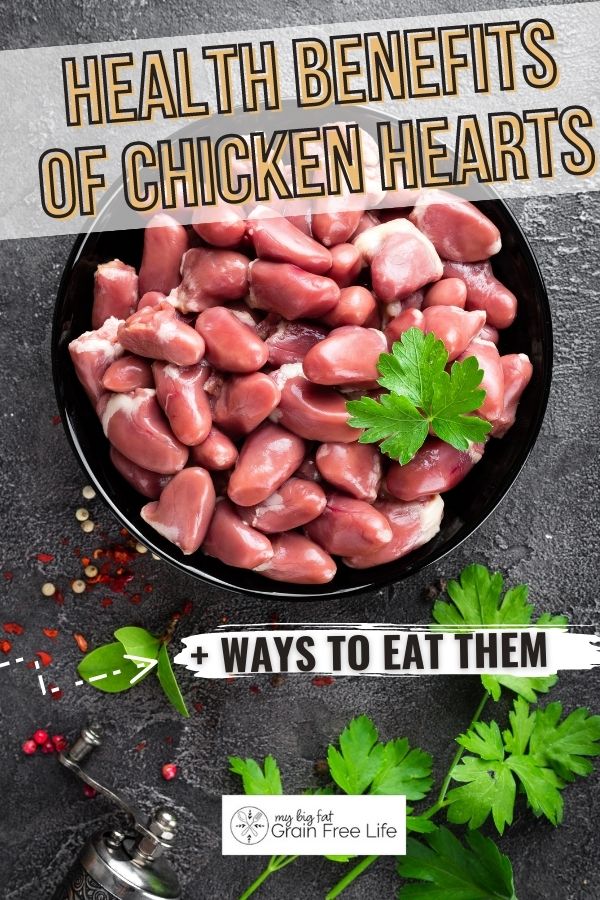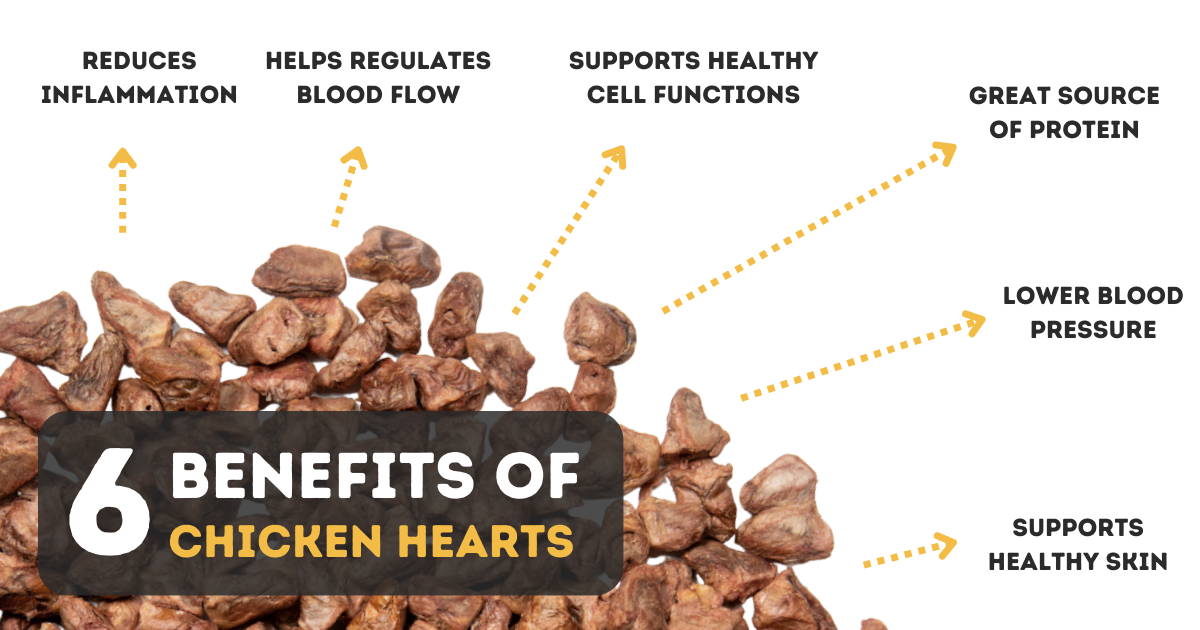Health Benefits of Chicken Hearts A Nutrient Powerhouse. Chicken hearts provide numerous health benefits including high amounts of protein, essential vitamins, and minerals beneficial for overall well-being. Chicken hearts are a nutrient-rich food source that offers several health benefits.
Packed with protein, vitamins, and minerals, they contribute to a well-balanced diet. High in iron, chicken hearts aid in producing healthy red blood cells, which promote good oxygenation throughout the body. They also contain vitamin B12, which is crucial for neurological health and the formation of DNA.
Additionally, chicken hearts provide zinc, selenium, and phosphorus, supporting immune function and bone health. Combining these nutrients makes chicken hearts a valuable addition to a nutritious diet. By incorporating them into your meals, you can enjoy the health-promoting advantages these organ meats offer.

Credit: www.amazon.sg
Rich Source Of Essential Nutrients
Chicken hearts are a rich source of essential nutrients that offer numerous health benefits. Let’s explore how these small yet mighty organ meats provide vital elements for our overall well-being.
Protein
Chicken hearts are packed with protein, which is essential for muscle growth and repair. They are a great option for those looking to increase their protein intake naturally.
Vitamins And Minerals
Chicken hearts are also loaded with vitamins and minerals that are vital for maintaining a healthy body. These include iron, zinc, phosphorus, and B vitamins, necessary for optimal health.
Supports Heart Health
When it comes to supporting heart health, chicken hearts are an excellent addition to your diet. Packed with nutrients, they offer several health benefits that can help keep your heart in top shape. Two key components of chicken hearts that contribute to heart health are omega-3 fatty acids and folate content.
Omega-3 Fatty Acids
Chicken hearts are a good dietary source of omega-3 fatty acids, which are essential fats that our bodies need but can’t produce on their own. These healthy fats play a crucial role in reducing the risk of heart disease and maintaining overall cardiovascular health.
Research has shown that a diet rich in omega-3 fatty acids can lower blood pressure, reduce triglyceride levels, and decrease the risk of abnormal heart rhythms. Omega-3s also help to improve the flexibility and elasticity of blood vessels, ensuring smooth blood flow through the arteries and reducing the risk of plaque buildup.
By incorporating chicken hearts into your meals, you can provide your body with these beneficial omega-3 fatty acids, which ultimately support heart health and help prevent cardiovascular issues.
Folate Content
Chicken hearts are also an excellent source of folate, a vital nutrient that plays a significant role in heart health. Folate helps to lower levels of homocysteine, an amino acid linked to an increased risk of heart disease.
When homocysteine levels are elevated, they can cause damage to the blood vessels and lead to the development of atherosclerosis, a condition characterized by the buildup of fatty plaques in the arteries. Having adequate folate levels in your body helps to regulate homocysteine and reduce the risk of atherosclerosis.
In addition to its role in lowering homocysteine levels, folate also promotes red blood cell production, which is essential for transporting oxygen throughout the body. By ensuring healthy oxygen levels in the blood, folate helps to maintain a healthy cardiovascular system.
Include chicken hearts in your diet to reap the heart-healthy benefits of their folate content, reducing the risk of heart disease and promoting overall heart health.
Boosts Immune System
Consuming chicken hearts can help strengthen your body’s defenses, promoting a robust immune system.
Antioxidants
Chicken hearts are rich in antioxidants, such as Vitamin A, Vitamin C, and selenium which help fight off harmful free radicals in the body, thereby boosting the immune system. These antioxidants play a vital role in reducing the risk of infections and illnesses.
Iron
Another essential nutrient found in chicken hearts is iron. Iron is crucial for the proper functioning of the immune system, as it helps in the production of white blood cells, the body’s main defense mechanism against infections.

Credit: mybigfatgrainfreelife.com
Improves Metabolism And Energy Levels
Chicken hearts are a powerhouse of nutrition that can do wonders for your metabolism and energy levels. Packed with essential nutrients like B vitamins and carnitine, they provide the necessary fuel your body needs to function at its best.
B Vitamins
One of the key reasons why chicken hearts are great for improving metabolism and energy levels is their high content of B vitamins. These vitamins play a crucial role in converting food into energy, helping your body effectively metabolize carbohydrates, fats, and proteins. By including chicken hearts in your diet, you can ensure that your body is getting the necessary B vitamins it needs to maintain optimal energy levels throughout the day.
Carnitine
Another important nutrient found in chicken hearts is carnitine. Carnitine plays a vital role in energy production by transporting fatty acids to the mitochondria, the powerhouse of your cells, where they are converted into fuel. This process not only helps improve your metabolism but also boosts your energy levels, keeping you feeling more alert and focused throughout the day.
By incorporating chicken hearts into your meals, you can enjoy the benefits of these nutrient powerhouses, reaping the rewards of improved metabolism and increased energy levels.
Aids In Red Blood Cell Production
Aids in Red Blood Cell Production:
Chicken hearts are a great source of essential nutrients that support red blood cell production. Iron content and Vitamin B12 present in chicken hearts play a vital role in maintaining healthy red blood cells in the body.
Iron Content
Chicken hearts are rich in iron, which is a crucial mineral for red blood cell production. Iron helps carry oxygen throughout the body, supporting overall cell function and energy levels.
Vitamin B12
Vitamin B12 found in chicken hearts helps in the formation of red blood cells. This vitamin is essential for proper nerve function and DNA synthesis, enhancing the body’s ability to produce healthy red blood cells.
Versatile Ingredient In Cooking
Chicken hearts are not only delicious but also incredibly versatile when it comes to cooking. They can be used in a wide variety of recipes and cooking methods, making them a valuable ingredient in your kitchen. Whether you choose to grill, sauté, or bake them, chicken hearts offer a unique taste and texture that can enhance any dish.
Recipes And Cooking Methods
There are numerous recipes that feature chicken hearts as the main ingredient, allowing you to explore different flavors and cuisines. Here are a few popular recipes:
- Chicken Heart Skewers: Marinate the chicken hearts in a mixture of olive oil, lemon juice, garlic, and your favorite herbs. Thread them onto skewers and grill them for a few minutes on each side until they are cooked through. The result is a succulent and flavorful appetizer or main course.
- Chicken Heart Curry: Sauté onions, garlic, and ginger in a pan until fragrant. Add spices like turmeric, cumin, coriander, and garam masala. Add chicken hearts and simmer them in a tomato-based sauce until tender. Serve over steamed rice for a satisfying meal with a hint of spiciness.
- Stuffed Chicken Hearts: Prepare a filling of breadcrumbs, herbs, and finely diced vegetables. Gently stuff the mixture into the chicken hearts and secure them with toothpicks. Pan-fry them until golden brown and crispy on the outside, resulting in a delicious and bite-sized appetizer.
Cultural Significance
Chicken hearts hold cultural significance in many cuisines around the world. In Brazilian cuisine, they are commonly served as a popular street food known as “espetinho de coração.” These skewered chicken hearts are marinated and grilled to perfection, providing a delightful snack or meal for locals and tourists alike.
In Japanese cuisine, yakitori, which translates to “grilled chicken,” includes chicken hearts as one of the skewered ingredients. Yakitori is a staple food enjoyed at izakayas (traditional Japanese pubs) and is often seasoned with a sweet and savory soy-based glaze, showcasing the versatility and unique flavor of chicken hearts.

Credit: www.healthline.com
Frequently Asked Questions On Health Benefits Of Chicken Hearts
Is Eating Chicken Hearts Healthy?
Yes, eating chicken hearts is healthy. They are high in protein, iron, and B vitamins, good for heart health and immune function. Additionally, they are a lean source of meat and can be enjoyed as part of a balanced diet.
Is Chicken Heart Better Than Breast?
Chicken hearts are nutrient-dense and packed with vitamins and minerals. However, chicken breast is leaner and lower in fat. Both have their own benefits, so including a variety in your diet is ideal for overall health.
Does Chicken Heart Have Collagen?
Yes, chicken hearts contain collagen. They are a good source of this protein that helps support healthy skin, joints, and bones.
Do Chicken Hearts Taste Like Liver?
Chicken hearts have a distinct flavor that is different from liver. They are more tender and have a richer taste.
Conclusion
To sum it up, incorporating chicken hearts into your diet can bring about a myriad of health benefits. With their high protein content and rich nutritional profile, these tiny organs can promote muscle growth, boost red blood cell production, and support a healthy cardiovascular system.
Moreover, their iron and vitamin B12 content can enhance energy levels and improve brain function. So why not give these nutrient-packed morsels a try and reap the rewards they offer for your overall well-being?


